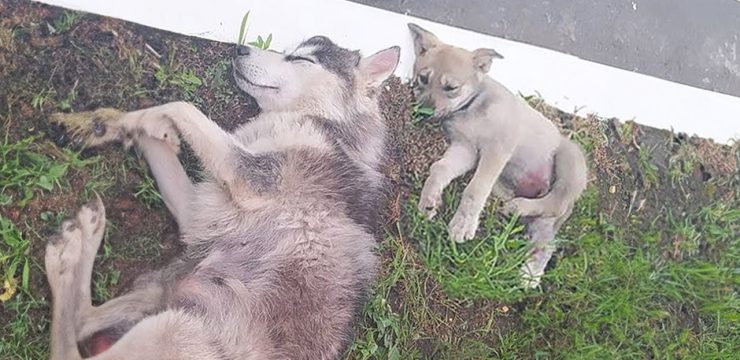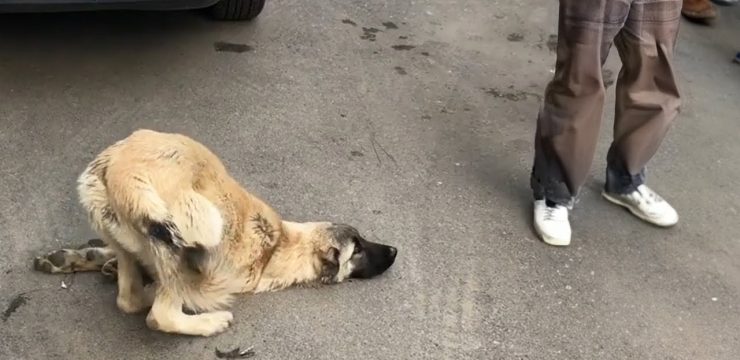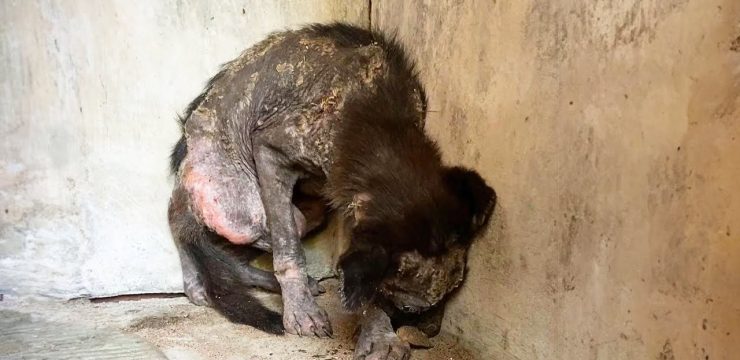In a quiet and remote stretch of countryside, a heartbreaking discovery was made that would eventually turn into a story of resilience and hope. A two-year-old lurcher, a gentle breed known for its speed and loyalty, was found chained tightly to a cold metal fence post. She was unable to move more than a few inches, her body restrained by a chain far too heavy for her small frame. What made the scene even more troubling was what lay at her side. Scattered on the rough ground, nestled against one another for warmth, were her six newborn puppies. Their eyes had not yet opened to the world, and their tiny cries were barely audible. With no food, no water, and no shelter, their chances for survival seemed desperately slim.

Even in such dire conditions, the mother dog displayed the kind of devotion that only a parent could understand. Despite being trapped, she tried to nurse her babies, curling her body as much as the chain would allow so the puppies could reach her milk. It was her instinct to protect, to comfort, and to keep them alive, no matter how difficult her own situation had become. This small act of maternal strength was what kept her puppies clinging to life.
No one knows exactly how long she and her litter had been left there. Rescuers who later arrived at the scene believed the mother had given birth shortly before being abandoned. The Daily Mail reported that the animals were most likely left behind not long after delivery, with no consideration for their fragile state. In that open field, surrounded by silence, the little family waited, enduring the elements with nothing but each other for support.

When they were finally discovered, the people who found them wasted no time in calling for help. The mother and all six puppies were carefully transported to the Irish Society for the Prevention of Cruelty to Animals (ISPCA) national facility located in County Longford. There, trained staff and veterinarians immediately stepped in to provide the urgent care they so desperately needed. Each puppy was checked for signs of dehydration and weakness, while the mother was gently examined to make sure she had not sustained long-term injuries from the heavy chain or from her ordeal in the cold.
The good news was nothing short of remarkable. Despite being left exposed to harsh conditions, all seven dogs were found to be in good health. The mother’s determination to nurse her little ones had kept them alive, and the timely rescue ensured they had a second chance at life. It was the kind of outcome that animal welfare workers say fuels their passion—proof that even in the darkest circumstances, compassion can tip the scales toward survival.
The six puppies, each with their own spark of personality beginning to show, were given names that carry a touch of charm and Americana. Billy Ray, Dixie, Dolly, Dotty, June, and Patsy are now safe in the care of the ISPCA, where they will remain until they are old enough to be adopted into loving homes. Their days are no longer spent shivering on the ground, but rather snuggled in warmth, surrounded by people who are making sure they are well-fed, comfortable, and socialized for the future families that will one day welcome them.
As for their mother, she too is receiving the love and attention she deserves. She is no longer bound by chains. Instead, she has space to stretch, clean bedding to rest on, and staff who greet her with gentle voices and kind hands. The ISPCA has seen countless cases of neglect and abandonment over the years, yet the resilience of this mother dog stands out as a testament to the strength of animals and their unwavering will to protect their young.

Beyond the individual rescue, the ISPCA has used this case as a reminder of the larger issue facing animal welfare organizations around the world. Shelters often operate at capacity, and the number of unwanted animals continues to rise. One of the most effective solutions, according to advocates, is the routine spaying and neutering of pets. By encouraging owners to take these responsible steps, communities can reduce the overwhelming number of litters born into uncertain futures. When animals are spayed or neutered, it helps prevent situations like this—where a mother and her puppies are left in dangerous conditions simply because someone could not or would not provide long-term care.
The ISPCA and many other groups continue to work tirelessly, not only rescuing animals in immediate need but also spreading awareness about responsible pet ownership. They emphasize that every animal deserves respect, shelter, and the chance to live free from suffering. In sharing stories like this one, they hope to reach people who might be considering adding a pet to their family, encouraging them to adopt from shelters rather than buying, and reminding them of the lifelong commitment that comes with caring for an animal.

For the mother lurcher and her puppies, their story is no longer one of despair but of hope renewed. They went from a lonely field where survival seemed uncertain to a safe place filled with compassion. Each day, they grow stronger, healthier, and closer to the lives they were meant to live. Soon enough, the puppies will be old enough to leave the shelter, each walking into a new chapter with families eager to provide them with love and stability. Their mother, too, will find her forever home, where chains and cold ground will be replaced with warmth, affection, and the freedom she deserves.
Stories like this remind us why animal welfare organizations matter so deeply. They remind us of the power of kindness, of how a simple act of rescue can change the course of seven lives. And most importantly, they remind us of the bond between mother and child—a bond strong enough to endure hardship, and one that, when supported by human compassion, can lead to a future filled with promise rather than fear.





